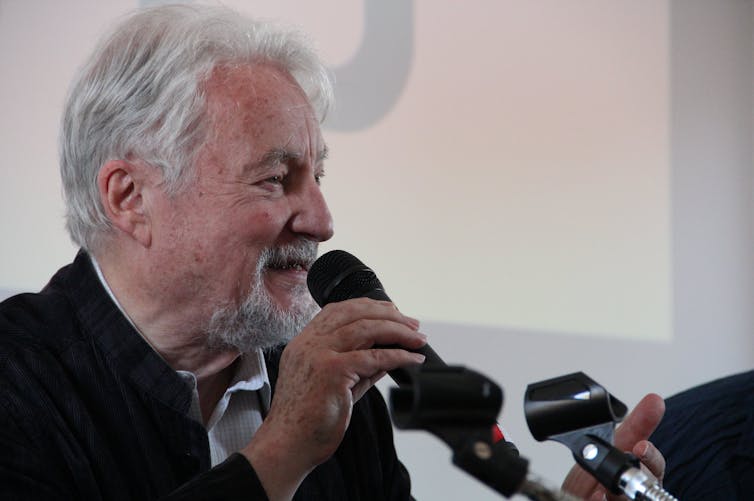Marc Augé, 1935-2023: Anthropologist Founder Of ‘Non-Places’

[The] city is a spatial figure of time in which present, past and future come together. It is, at times, a cause for astonishment and, at others, for remembrance or expectation […]. In this sense, the city is both an illusion and an allusion. -Marc Augé
We head to the mall to do some shopping. Since it’s out in the suburbs, we take the car. Along the way, we pay less attention to our surroundings than to the traffic signs we encounter, with which we automatically comply.
When we arrive at our destination, we walk through the doors (also automatic), and navigate the aisles of the store by following, once again, the signs. We select products by either studying their ingredients or simply by their brand name. We come across other people, but don’t converse with them. At the cash register, new figures and familiar phrases await us.
We frequent these kinds of spaces on a daily basis: subway systems, gas stations, airports, malls, theme parks. Unlike traditional settings, they aren’t intended as places to dwell, but simply to be transited.
Non-places
French anthropologist Marc Augé, who died on July 24, is renowned for his concept of “non-places.” His 1993 text of the same name describes a reality that is very much relevant to our everyday lives.
By reading it, we can better grasp the apparent paradox of life in the big city. That is to say, why, despite the fact that we are surrounded by so many people, we still often feel lonely.
As is often the case with any frequently quoted statement, its meaning has often been reduced to a negative critique of the spaces that modern capitalist societies have created.
The fact is that a non-place is a depersonalized space in which we act as mere users, devoid of history – what does the history of a supermarket matter? However, it’s also relational since in these spaces we become cashiers, drivers, customers, etc. and in those terms, we interact with others. This illustrates that the non-place is defined, by its very nature, by what it is not.
It’s precisely for this reason that the term is so elusive. However, no space can be understood simply by being a place or a non-place, but by what we do in it and with it. Of course, as a function of their design and purpose, an airport or a supermarket have far more chances of being labeled a non-place than a town square.
Nonetheless, as its users, we are able to redefine it, however tenuous or temporary that may be. After all, Nobel Prize-winning author Annie Ernaux turns a supermarket into a place for romance in _Look at the Lights, My Love. It seems the French have a knack for unlocking the aesthetic potential of non-places.

Augé and beyond
Augé’s more recent works should also be remembered in the wake of his death. These include Pour une anthropologie de la mobilité, which examines the concepts of borders and migration in the context of the globalized world.
Meanwhile, L’impossible voyage: le tourisme et ses images, reminds us that, strictly speaking, the concept of travel is a difficult undertaking in the modern world of mass media since we have already consumed images and perceptions of our destination before we set out on our journey. These days, it’s impossible for us to replicate the experience of Ulysses facing the unknown.
Augé taught us a great many things. For instance, that we need not travel to inhospitable lands, if that notion still exists, in order to be anthropologists. He started out, in fact, in African studies. Although Augé was born and died in Poitiers, most of his texts focus on Paris, where he spent much of his life.
He also demonstrated that academic prose is no impediment to beautiful writing. He enjoyed providing
literary and cinematographic examples, illustrating that links between anthropology or philosophy and the arts are not only possible, but necessary.
For the scholar, our experience of the city must not be limited to its infrastructures. Instead, it should comprise the dynamic result of the complex interplay of our personal memories and experiences, the collective past and the arts. Some of his other examples include Venice, which cannot be viewed without the filter of Thomas Mann, Santiago de Chile, without recalling Isabel Allende, and San Francisco, without picturing the mysterious woman in Alfred Hitchcock’s masterpiece Vertigo.
Even if we haven’t read anything by Charles Baudelaire, we have acquired a series of expectations about Paris that have, to a large extent, a lot to do with his tableaux (portraits of the city).
In effect, the city is what we see, but also what we don’t see. Its streets, or what’s left of them, or even the buildings that are no longer there, in a gentle or violent manner, transport us to other times, and that’s why every city is like poetry of which we are readers and, at the same time, writers.
Or, in the words of Augé himself:
Urban planners, architects, artists and poets ought to realize that their fate is intertwined and that their raw material is the same: without the imaginary there would be no city, and vice versa.

































































































